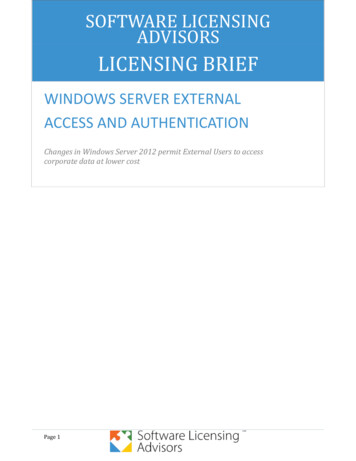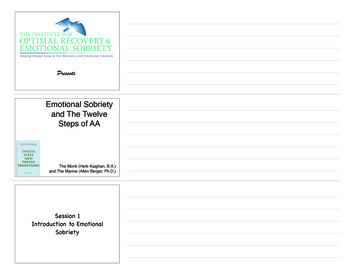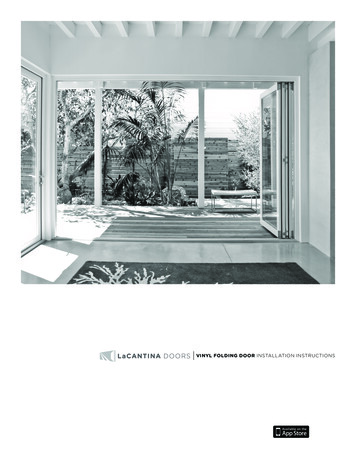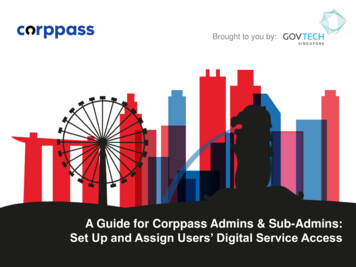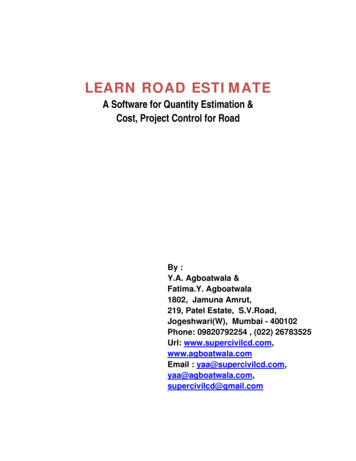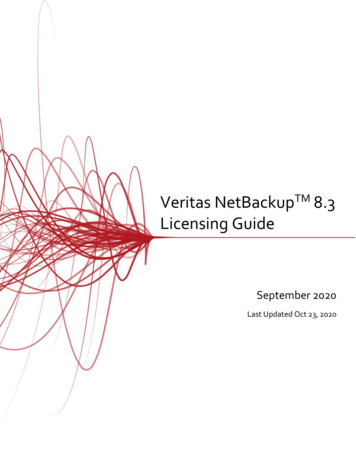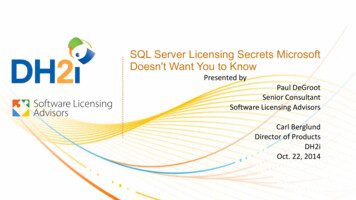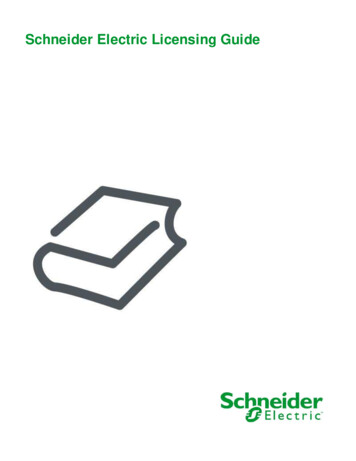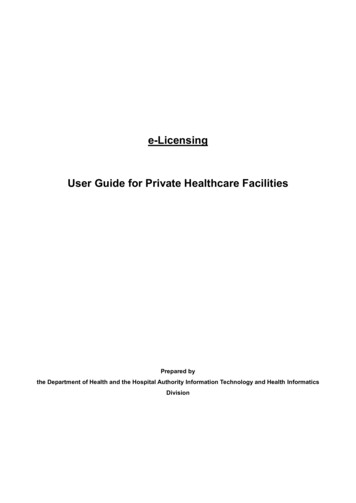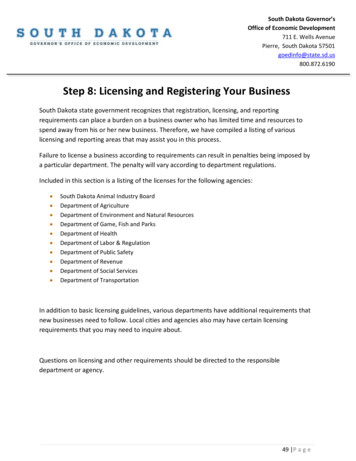
Transcription
South Dakota Governor’sOffice of Economic Development711 E. Wells AvenuePierre, South Dakota 57501goedinfo@state.sd.us800.872.6190Step 8: Licensing and Registering Your BusinessSouth Dakota state government recognizes that registration, licensing, and reportingrequirements can place a burden on a business owner who has limited time and resources tospend away from his or her new business. Therefore, we have compiled a listing of variouslicensing and reporting areas that may assist you in this process.Failure to license a business according to requirements can result in penalties being imposed bya particular department. The penalty will vary according to department regulations.Included in this section is a listing of the licenses for the following agencies: South Dakota Animal Industry BoardDepartment of AgricultureDepartment of Environment and Natural ResourcesDepartment of Game, Fish and ParksDepartment of HealthDepartment of Labor & RegulationDepartment of Public SafetyDepartment of RevenueDepartment of Social ServicesDepartment of TransportationIn addition to basic licensing guidelines, various departments have additional requirements thatnew businesses need to follow. Local cities and agencies also may have certain licensingrequirements that you may need to inquire about.Questions on licensing and other requirements should be directed to the responsibledepartment or agency.49 P a g e
Step 8: Licensing and Registering Your BusinessSouth Dakota Animal Industry Board411 S. Fort StreetPierre, SD 57501Phone: (605) 773-3321Web: http://aib.sd.gov/Auction Market LicenseOwners of livestock auctions need to be licensed prior to selling any livestock.Duration: 1 yearCost: 100Pet Food Processing LicenseAny person who operates a business for the purpose of processing pet food must be licensed.Duration: 1 yearCost: 25Livestock Dealers LicenseAny person who engages in the buying and selling of animals must be licensed.Duration: 1 yearCost: 50Rendering Plant LicenseAny person who operates a business for the purpose of disposing of dead animals, hides, etc.must be licensed.Duration: 1 yearCost: 25Meat PlantAny meat plant needs to have the facilities and equipment inspected prior to operating andneeds to be licensed with the South Dakota Animal Industry Board.Duration: 1 year50 P a g e
Step 8: Licensing and Registering Your BusinessCost: Slaughter 100Processing 100Custom 50Retail 20Contract Hauler PermitAny person who maintains a contract with a licensed rendering establishment from SouthDakota or from another state for the transport of carcasses to such rendering establishment orfor the transport of carcasses to or from a collection station.Duration: 1 yearCost: None51 P a g e
Step 8: Licensing and Registering Your BusinessSouth Dakota Department of AgricultureDivision of Agricultural Services523 E. Capitol, Foss Building – Third FloorPierre, SD 57501Phone: (605) 773-3724Web: http://sdda.sd.gov/ag-services/Resident Nurseryman/Nursery Stock Dealer/OtherBeginning July 1, 2016 nursery stock dealers and resident nurserymen selling nursery stock willbe required to purchase a license annually and pay a fee if selected for inspection. Annual plantgrowers and others may also purchase a certificate of inspection if needed for interstatecommerce.Greenhouses, tree nurseries, and nursery stock retail outlets are inspected to ensure thatconsumers receive healthy, viable stock. In addition, nursery stock that will be shipped out ofstate is inspected and certified as meeting standards of plant health for interstate commerce.Duration: 1 yearCost: Resident Nurseryman (Grows all or a portion of the nursery stock he sells): 42.50 (Sales under 5,000) or 200 (Sales over 5,000)Nursery Stock Dealer: 70 (Sales under 5,000); 115 (Sales 5,000- 20,000); or 200(Sales over 20,000)Note: A nursery stock dealer who is not a nurseryman is someone who 1) buys nursery stock forthe purpose of reselling or reshipping; 2) makes landscape plans using nursery stock andnegotiates the purchase of nursery stock for clients; or 3) contracts to furnish and plant nurserystock.Growers & Dealers of Decorative Plants, Annual Plants, Sod or Related Plant Products: 250 plus 5 per acre and 5 or 10,000 sq.ft. of growing greenhouse.Nursery Inspection Fee: 215Export Inspection PermitPhytosanitary certificates are issued by the Department of Agriculture on plants or plantproducts for shipment to other states and countries in compliance with the plant inspection andplant quarantine regulations of the state or country of destination.The fees for inspection, obtaining samples, or issuing certificates are as follows: On-site inspection-- 200Field Inspection--- 250 for the first acre and 2 for each additional acre52 P a g e
Step 8: Licensing and Registering Your Business State Certificate-- 50Federal Certificate-- 125Reissue State or Federal Certificate-- 25Commercial FeedAny company who manufactures feed in South Dakota or whose name appears on the label of afeed distributed in South Dakota must be licensed. Commercial feeds include livestock and petfeeds.Duration: 2 yearsCost: 50Fertilizer Distribution LicenseAny person(s) or business who manufactures or mixes fertilizer in South Dakota or whose nameappears on the label of a fertilizer must be licensed.Duration: 2 yearsCost: 25Soil Amendment ProductsAll soil amendment products must be registered.Duration: 2 yearsCost: 25 per productSeed PermitBefore selling, distributing, advertising, soliciting orders for, offering for sale, exposing for sale,or transporting seed, a person must obtain a seed permit from the Department of Agriculture. Apermit is not required for those who sell or advertise seed they have produced, provided thatthe seed is stored or delivered only to a purchaser on or from the farm where it was grown, orthe production and sale of seed is not a primary source of income to the seller. Each permitapplicant must agree to provide the Secretary of Agriculture with a legible copy of any records,and access during customary business hours to the premises where the seed is sold, handled orstored.Duration: 2 yearsCost: 500/Seedsman (Any person who purchases, conditions, labels, or sells seed as a majorpart of his or her business.) 75/Seed Producer (Any person who labels and sells seed only of his own production.) 75/Seed Dealer (Any person who exposes seed for sale, maintains an unsold inventory,and sells seed, or takes and fills orders for seed for a Seedsman or Seed Producer, butdoes not condition or label seed.)53 P a g e
Step 8: Licensing and Registering Your BusinessBeekeepersThe goals of the apiary program are to protect South Dakota’s apiary (beekeeping) industry fromthe spread of apiary diseases; to coordinate the interstate movement of bees; advisebeekeepers on the identification and treatment of honeybee pests and diseases; and to promotethe value of beekeeping to the residents of South Dakota and the value of the premium honeyproduced in the state. Beekeepers must register with the department the location of each apiaryand how many colonies are on these yards.Duration: 1 yearCost: 12 per locationPesticide ProductsState law requires that all pesticide products sold in South Dakota be registered with the SouthDakota Department of Agriculture. Product labels are reviewed for compliance with state andfederal labeling requirements.Duration: 2 yearsCost: 120 per productPesticide/Fertilizer Bulk Storage FacilitiesEach storage facility must be constructed as approved and operated in accordance with theirpermit.Duration: PermanentCost: NonePesticide Applicator LicenseAny person(s) that sprays lawns, crops, etc. for hire must have this license, with someexemptions for government employees.Duration: 2 yearsCost: 25Restricted Use Pesticide Dealer LicenseAny person(s) or business that sells products classified as “restricted use” under federal or statelaw must be licensed.Duration: 2 yearsCost: 50Dairy Producers PermitsAnyone wishing to produce milk for sale to a dairy plant for bottling or further processing inSouth Dakota must first have their facility approved by the Department of Agriculture andreceive a permit to operate from the department.Duration: Permanent54 P a g e
Step 8: Licensing and Registering Your BusinessAssessment Fee: Each producer is required to pay a raw milk assessment fee on eachhundredweight of milk produced. This fee is collected by the dairy plant purchasing the milkfrom the producer and forwarded on to the department. The assessment fee is currently .07per hundredweight.Permit for Production of Raw Milk for Human ConsumptionAnyone wishing to produce and sell raw milk for human consumption in South Dakota must firsthave their facility approved by the Department of Agriculture and receive a permit to operatefrom the department.Duration: PermanentCost: NoneLicense for the Sale of Raw Milk for Human ConsumptionAny producer of milk who is selling raw milk for human consumption directly to the consumermust obtain a license.Duration: 1 yearCost: 50Note: Producers are also required to pay for a monthly sample to be tested by the Department or alaboratory accredited by the department.Dairy Plant LicenseAny dairy plant engaged in the buying or selling of milk or milk products in the state must belicensed. Also included in this group are receiving stations, transfer stations, and plantsfabricating single-service articles.Duration: 1 yearCost: In state milk processing plants (includes frozen dairy plant)a) Less than 100,000lbs/day - 250b) 100,000 to 500,000lbs/day - 500c) Over 500,000lbs/day - 1,000d) Single-service Fabricating Plant - 250e) Receiving Station - 250f) Out of state milk processing plants - 250e) Transfer Station - 100Milk or Milk Product DistributorAny person(s) or business distributing milk or milk products in the state must be licensed.Duration: 1 yearCost: 25055 P a g e
Step 8: Licensing and Registering Your BusinessDairy Industry Fieldman LicenseAny person(s) or business that buys milk for packaging or processing must have a licensed DairyIndustry Fieldman license.Duration: 1 yearCost: 50Milk Sampler/Grader LicenseAny person who is a milk bulk hauler must be licensed as an Official Sampler.Duration: 1 yearCost: 50Tester/Grader LicenseAll dairy processing plants must have licensed lab technicians to test the milk and approve themilk before payments can be made to the suppliers of the milk.Duration: 1 yearCost: 50Egg Producers and DealersA license is required for anyone in the business of buying, selling, processing, candling, grading,packing, or distributing eggs in South Dakota. Producers selling and delivering their ownproductions directly to consumers are exempt from licensing requirements.Any person(s) or businesses that buy eggs from producers for resale, or producers of eggs whosell eggs from their flock only need a Class A License.Duration: 1 YearCost: 10Any person(s) who buys eggs from a Class A Dealer must have a Class B license. Class B Dealersare those people who buy eggs from other wholesalers and producers and in turn sell the eggsto retailers or institutional consumers in lots greater than 90 dozen.Duration: 1 yearCost: 100Candler/Grader LicenseAnyone who sells eggs or buys eggs for institutional use or resale must be licensed as aCandler/Grader and pass a test administered by the Department of Agriculture.Duration: 1 yearCost: 1056 P a g e
Step 8: Licensing and Registering Your BusinessSouth Dakota Department of Environment andNatural ResourcesJoe Foss Building523 East Capitol AvenuePierre, SD 57501Phone: (605) 773-3151Web: http://denr.sd.gov/ ; http://denr.sd.gov/onestop.aspxAir Pollution Control PermitAny facility that emits an air contaminant must obtain an air pollution control permit. Thedepartment must receive the application for a new facility 180 days before construction begins.Duration: 5 yearsCost: An application fee of 135 is required for a construction permit for a major source, aninitial Title V air quality operating permit, a permit renewal for a Title V air quality operatingpermit, and a permit modification for a Title V air quality operating permit, except ethanolplants. Ethanol plants are required to pay a one-time application fee of 1,000 for a newethanol plant. In addition, there is an annual dollar per ton fee and administrative fee. Thedollar per ton fee is 8.10 per ton of actual air emissions, except ethanol plants. Ethanol plantspay a dollar per ton fee of 40 per ton of actual air emissions. The annual administrative fee,except ethanol plants, is 135 for actual air emissions less than 50 tons per year; 650 for actualair emissions of 50 tons per year or greater but less than 100 tons per year; and 1,350 foractual air emissions of 100 tons per year or greater. Ethanol plants pay a flat administrative feeof 1000.Asbestos LicensesAny person wishing to do asbestos related work in South Dakota needs to be certified by thestate. Individuals can be certified as inspectors, management planners, abatement projectdesigners, contractor/supervisors and workers. One person can be certified in more than onediscipline.Duration: 1 year initialCost: 1001 year renewalCost: 50Initial certification is valid for one year from the date of the training examination.Renewal fee requires the individual to take a refresher course within 90 days prior to or 90 daysafter the certificate’s expiration date and apply forrecertification within this 180-day time frame.57 P a g e
Step 8: Licensing and Registering Your BusinessBuilding owners and/or contractors planning to demolish, or planning to remove friable asbestosfrom, public and commercial buildings are required to notify the state in writing 10 businessdays prior to the start of the project.Solid Waste Disposal PermitOperators of solid waste treatment, temporary storage, land application and disposal sites andfacilities must obtain a permit prior to construction or operation of the facility or site.Duration: 2 year initial5 year renewalCost: 250 to 5,000Fee schedule and type of facility:Type I facility – 150,000 tons or more of solid waste per year 5,000Type II facility – between 5,000 tons and 149,999 tons of solid waste per year 500Type III facility – between 500 tons and 4,999 tons of solid waste per year 250Type IV facility – less than 500 tons of solid waste per year no fee requiredHazardous Waste PermitAnyone who treats, stores or disposes of hazardous waste must obtain a permit.Notice must be given to the department by anyone who generates, transports, stores, treats ordisposes of a hazardous waste. Although fees are required of companies applying for ahazardous waste permit, hazardous waste notifications do not require a fee. Applications forhazardous waste permits must be submitted 180 days prior to construction.Duration: Initial permit valid for two yearsCost: 50,000 to 175,000 (application fees apply only to hazardous waste disposal facilities)Permit renewal: Valid for five yearsCost: 25,000Annual operating fee: 25,000/yr - facilities disposing of 500 tons/yearDisposal fee: 50.00/ton or part thereof – accrued at the time waste isdisposed of at the facility and payable the following month58 P a g e
Step 8: Licensing and Registering Your BusinessSand, Gravel or Rock LicenseA license is required for any person(s) or business that mines for: Sand, gravel or rock to be crushed and used in construction.Pegmatite minerals.Iron ore, limestone, sand, gypsum, shale, pozzolan or other materials used inthe process of making cement or lime.Lake dredging spoils for sale or processing.A reclamation bond of 500 per acre or 20,000 for statewide mining is required.Duration: 1 yearCost: 100 for each privately operated mine site authorized under a mine license.Permit to Drill for Oil or GasAny operation with the intent to drill for oil or gas must obtain a permit prior to drilling. On July1, 2013 new plugging and performance bond requirements became effective. The bond amountsfor wells at or deeper than 5,500 feet are 50,000 per well or 100,000 blanket. The bondamounts for wells less than 5,500 feet in depth are 10,000 per well or 30,000 blanket.Operators can continue to operate under existing bonds until a new well is drilled or an existingwell is transferred.Duration: 1 yearCost: 100Exploration Notice of IntentAny person desiring to conduct mineral exploration in the state must file anexploration notice of intent with the department. A fee, reclamation plan, andmaps are required. A reclamation bond based on the cost to plug all of theproposed test holes and reclamation of the affected land as determined by DENRis required. In lieu of submitting a bond for each exploration operation, a 20,000statewide reclamation surety can be submitted.Duration: Life of exploration projectCost: Application fee 25059 P a g e
Step 8: Licensing and Registering Your BusinessUranium Exploration PermitAny person desiring to conduct exploration for uranium in the state must firstsubmit a permit application to the department and must be granted a permit bythe Board of Minerals and Environment. A fee, map, plan of operations, reclamation plan, andpublic hearing are required. A reclamation bond based on the cost to plug all of the proposedtest holes and reclamation of the affected land as determined by DENR is required.Duration: 3 yearsCost: 500Large Scale Mining PermitA large scale mine permit is required for any mining operation that: Affects more than ten acres or extracts more than 25,000 tons of ore oroverburden per year;Employs in situ mining; orUses cyanide, chemical or biological leaching processes.A reclamation bond based on the actual cost of reclamation determined byDENR is required. Operations that use chemical or biological leaching may berequired to post an additional bond to respond to spills.Duration: Life of mineCost: Application fee – Precious metal, coal, or uranium: 50,000Other large scale: 1,000Annual renewal fee – Precious metal, coal, or uranium: 50,000Other large scale: 100Small Scale Mining PermitAny mining operation that affects less than ten acres and extracts less than25,000 tons of ore or overburden per year must obtain a permit. A reclamationbond of up to 2,500 is required.Duration: Life of mineCost: Application fee 100Annual renewal 5060 P a g e
Step 8: Licensing and Registering Your BusinessNew Water System ApprovalAll new community and non-transient non-community water systems constructed after October1, 1999, are required to obtain a Certificate of Approval from this department before beginningoperation. This includes systems that do not meet the definition of community or non-transientnon-community water system at start-up, but are designed to one day meet that definition.Duration: Minimum 90 days prior to system start-up.Cost: NonePermit to Appropriate WaterExcept for certain domestic uses, any person(s) or business that wishes to appropriate water forany purpose must obtain a water right permit.Duration: PermanentCost: Application – minimum 100 to 500 or more depending on amount of waterappropriated.License fee 200.Dry Draw Location NoticeA location notice is needed for any proposed dam/dugout impounding 25 acre feet of water orless at the primary spillway elevation with water stored for in-place uses only. Any dam on anavigable stream requires obtaining a permit to appropriate water.Duration: PermanentCost: 50Flood Control PermitExcept for dry draws, a flood control permit is required for any operation divertingthe flow or changing the stage of surface water for the purpose of flood control.Duration: PermanentCost: 50061 P a g e
Step 8: Licensing and Registering Your BusinessTemporary PermitThe chief engineer may issue temporary permits for the use of public water forconstruction (e.g. highway construction/maintenance), testing, or drilling purposes.Issuance of a temporary permit is not a grant of a water right.Duration: Up to end of calendar yearCost: NoneWell Driller LicenseAny well must be constructed by a licensed well driller. Any person(s) applying for a well driller’slicense must be experienced and knowledgeable in state well construction standards andcomplete a test in order to obtain a license.Duration: 1 yearCost: Annual 200 - residentAnnual 300 - nonresidentContinuing education requirements for renewal of licenseWell Pump Installers LicenseThe installation of well pumps or repair of wells for compensation must be by alicensed well pump installer or well driller. Individuals must have two years ofexperience and pay an annual fee.Duration: 1 yearCost: Annual 200 - residentAnnual 300 – nonresidentContinuing education requirements for renewal of licenseGeneral Water Pollution Control Permit for Concentrated Animal Feeding OperationsA producer needs a permit for a large concentrated animal feeding operation when DENRdetermines an operation is a medium or small concentrated animal feeding operation thatneeds permit coverage to ensure protection of the state’s water resources, or when theoperation, regardless of size, is required to obtain approval by a local government entity, such asa county commission. The general permit was reissued and became effective on April 15, 2017.62 P a g e
Step 8: Licensing and Registering Your BusinessDuration: The state general permit is effective for 5 years. If a producer obtains coverageunder the permit after the permit has been effective for 2 years, theduration would be 3 years.Cost: The annual fee is 250 for operations with 2,000 or more animal units, 175 foroperations with 1,000 to 1,999 animal units, and 100 for operations with less than1,000 animal units.Wastewater Discharge PermitThe owner of any facility that discharges wastewater to waters of the state must apply for apermit at least 180 days prior to the anticipated discharge.Duration: 5 yearsCost: Typically 600 for many industrial facilities, but may be higher depending on the type offacility. Municipal facility fees vary depending on population.Water and Wastewater Operator CertificationMany water and wastewater systems must be operated by personnel that are certified by thestate as having the background and knowledge to run a certain type of water system. Anoperator can obtain this certification by passing a DENR proctored exam.Duration: 1 yearCost: Exam fee - 10Annual renewal of certificate - 6Pretreatment Industrial User PermitAny industry that is discharging process wastewater to a municipal sanitary sewer system mustcontact the department to determine if a pretreatment industrial user permit is necessary. If thepermit is needed, it will regulate the industrial discharge to ensure the industry does notoverload the city’s system. The application for a permit must be submitted at least 180 daysprior to the anticipated discharge.Duration: 5 yearsCost: 600 per year63 P a g e
Step 8: Licensing and Registering Your BusinessConstruction Storm Water Discharge PermitConstruction sites that disturb one or more acres must receive coverage under the generalpermit for storm water discharges associated with construction activity. This general permit isrequired for any construction site that disturbs at least one acre across the state.Duration: The state general permit is effective for 5 years. A construction site operatormust maintain coverage under the general permit until the construction hasbeen completed and the site has been stabilized.Cost: Based on the size of the project. The annual fee is 100 for projects less than 5 acres; 250 for projects 5 to less than 40 acres; 500 for projects 40 to less than 80 acres; and 750for projects that are 80 acres or more.Industrial Storm Water Discharge PermitStorm water discharges associated with industrial activity, including but not limited toindustrial plant yards, immediate access roads and railroad sidings, drainage ponds, materialhandling sites, refuse sites, process wastewater sites, equipment handling/maintenance areas,residual treatment areas and loading/unloading areas, will be required to obtain a permit.Duration: The state general permit is effective for 5 years. An industrial site operatormust maintain coverage as long as the industrial activities continue.Cost: None at this time, but DENR is working on developing fees for these permitsNotification for Underground and Aboveground TanksPlans and specifications for installation or upgrade of a regulated underground or abovegroundstorage tank system must be submitted for review and approval at least 30 days prior tostarting the installation or modification. All regulated underground or aboveground storage tanksystems must receive department approval prior to installation.Duration: NoneCost: NoneRadiation Source LicenseAny non-medical facility, be it public or private, using nuclear materials and/or equipment mustbe registered with the department.Duration: NoneCost: None64 P a g e
Step 8: Licensing and Registering Your BusinessGround Water Discharge PlanA ground water discharge plan may be required for any facility that discharges waste orpollutants that may move directly or indirectly, into ground water. If required, the facility mustapply to the secretary for an approved groundwater discharge plan at least 180 days before anydischarge.Duration: Generally 4 years, maximum of 5 yearsCost: NonePermit to Inject Class II FluidsA permit to inject is required for the injection of any substances associated with oil and gasproduction including maintaining reservoir pressure, enhanced recovery operations, disposal ofexploration and production waste, or storage of liquid hydrocarbons.Duration: Permits to inject may be issued for the operating life of the injection well.Cost: NonePlans and Specifications ApprovalPlans and specifications for water and wastewater treatment, collection, and distribution mustbe submitted for review and approval at least 30 days prior to construction. Other than aconventional septic tank/drain field on-site system for a home, plans and specifications for allon-site wastewater systems must receive department approval.Duration: The approval to begin construction is valid for two years.Cost: NoneSARA Title III Tier II Emergency and Hazardous Chemical Inventory FormAny business storing a hazardous material in an amount in excess of a federal threshold mustsubmit this annual report. Most substances that require an OSHA safety data sheet have adesignated threshold of 10,000 pounds. However, some Extremely Hazardous Substances havelower reporting thresholds. The report must be submitted to the state of South Dakota, localemergency planners, and the local fire department by March 1. The report covers storage forthe preceding calendar year.Duration: Annual ReportCost: 50 to 300 depending on the number of substances reported.65 P a g e
Step 8: Licensing and Registering Your BusinessSARA Title III Toxics Release Inventory ReportThis annual report details disposal, releases, and transfers of specific substances for thepreceding calendar year. A business must report by July 1, if they meet three federal reporting criteria:1) Employ the equivalent of 10 full time employees; 2) business activity type falls underone of the covered North American Industrial Classification Codes (NAICS Codes); and 3)manufacture, process, or otherwise use an above threshold amount of a listed substance. Thereport must be submitted to the state of South Dakota and the federal Environmental ProtectionAgency.Duration: Annual ReportCost: 250 to 3,000 depending on the number of substances and quality of releases reported.66 P a g e
Step 8: Licensing and Registering Your BusinessSouth Dakota Department of Game, Fish and ParksLicensing Office20641 SD Hwy 1806Ft. Pierre, SD 57532Phone: (605) 223-7660Web: https://gfp.sd.gov/forms/Taxidermist LicenseAnyone engaged in taxidermy must be licensed.Duration: 1 yearCost: 15Resident Fur Dealer LicenseAny business that purchases hides and furs must be licensed. (Deer hides are exempt)Duration: 1 yearCost: 100Non-Resident Fur Dealer LicenseAny person(s) or business that purchases, receives and resells legally taken and/or possessedraw furs must be licensed. (Deer hides are exempt)Duration: 1 yearCost: 500Resident Retail Bait Dealer LicenseAny person(s) over 16 years of age selling minnows, frogs, reptiles, crayfish, salamanders, orother live bait in South Dakota must be licensed. (Night crawlers and leeches are exempt.)Duration: 1 yearCost: 3067 P a g e
Step 8: Licensing and Registering Your BusinessResident Wholesale Bait Dealer LicenseAny person(s) or business that raises traps, seines, buys, transports, or sells live bait to retailers,other wholesalers or exporters in South Dakota must be licensed.Duration: 1 yearCost: 275Resident Export Bait Dealer LicenseAny person(s) or business that buys, possesses, and transports live bait from South Dakota forresale must be licensed.Duration: 1 yearCost: 400Non-Resident Wholesale Bait Dealer LicenseAny person(s) or business that transports bait into South Dakota must be licensed.Duration: 1 yearCost: 550Falconry PermitAny person(s) who possesses raptors (birds) for the purpose of practicing falconry must belicensed.Duration: 4 yearsCost: 50Noncommercial Captive Game Bird License:Authorizes a person to possess, produce, and release game birds from captivity. Game birdsunder this license may not be sold or offered for sale.Duration: 1 yearCost: Resident 10Nonresident 2068 P a g e
Step 8: Licensing and Registering Your BusinessCommercial Captive Game Bird License:Authorizes a person to possess, produce, release from captivity, sell offer for sale, and ship gamebirds.Duration: 1 yearCost: Resident 50Nonresident 100Hoop Net or Set Line PermitA special permit is required in addition to a fishing license that allows residen
South Dakota Governor's Office of Economic Development 711 E. Wells Avenue Pierre, South Dakota 57501 goedinfo@state.sd.us 800.872.6190 49 Page Step 8: Licensing and Registering Your Business . South Dakota state government recognizes that registration, licensing, and reporting
